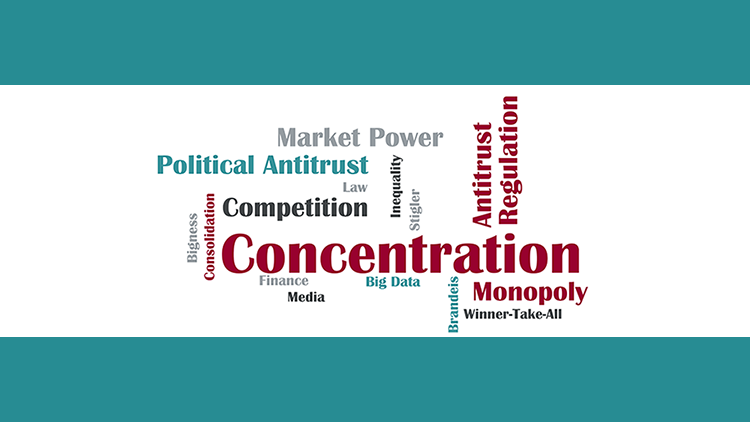In this installment of ProMarket’s new interview series on concentration in the U.S., American University law professor Jonathan Baker shares some thoughts on marker power and bigness. “In some of their major markets, large IT firms are likely insulated from competition.”
Does America have a concentration problem? On March 27-29, the Stigler Center will host a first-of-its-kind, three-day conference in Chicago that will focus on this very question.
The conference will bring together dozens of top academics from law, economics, history, and political science, policymakers, journalists, and public intellectuals, including two keynote speakers: Margrethe Vestager, the European Commissioner for Competition, and Judge Richard A. Posner of the U.S. Court of Appeals for the 7th Circuit in Chicago and the University of Chicago Law School.
Ahead of this conference, we decided to present influential scholars and intellectuals with some questions on concentration, market power, and bigness—and their potential effects on the U.S. economy. You can find previous installments here.

Jonathan B. Baker is a Professor of Law at the American University Washington College of Law. His work focuses primarily on the areas of antitrust and economic regulation. He served as the Chief Economist of the Federal Communications Commission from 2009 to 2011, and as the Director of the Bureau of Economics at the Federal Trade Commission from 1995 to 1998.
Previously, Baker worked as a Senior Economist at the President’s Council of Economic Advisers, Special Assistant to the Deputy Assistant Attorney General for Economics in the Antitrust Division of the Department of Justice, an Assistant Professor at Dartmouth’s Amos Tuck School of Business Administration, an Attorney Advisor to the Acting Chairman of the Federal Trade Commission, and an antitrust lawyer in private practice.
In an interview with ProMarket, Baker shared some thoughts on concentration and its potential effects on the U.S. economy.
Q: The discourse on concentration, market power, and bigness in many U.S. industries has increased dramatically in the last year. Do you believe that we have enough empirical evidence to show that concentration is on the rise and having adverse effects on the economy?
We should worry about the exercise of market power in the U.S. economy today for a number of reasons. One is that concentration has increased in some industries and possibly overall. Others are insufficient deterrence of anticompetitive conduct involving coordination, mergers, and exclusion; increased equity ownership of rival firms by diversified financial investors, the durability of market power, the rise of dominant information technology platforms, increased governmental restraints on competition, and the decline in economic dynamism. I discuss concentration trends and these additional reasons to think the U.S. has a market power problem in a just-released policy brief.
Q: Which industries should we be concerned with when we look at questions of concentration? Do we have evidence of excessive market power, reduction in quality or investment, or growing political influence?
Airlines, beer, and hospitals are visible examples of the major industries that have become substantially more concentrated over recent decades, creating concern about the exercise of market power.
Q: Has consolidation in the financial industry played a role in concentration or antitrust issues in the U.S.?
Large institutional investors now collectively own roughly two-thirds of the shares of publicly traded U.S. firms overall, so it has become common for rival firms to have common financial investor ownership. This is cause for concern because recent studies of the airline and banking industries by José Azar, Martin Schmalz, and their colleagues suggest that when competing firms have the same large shareholders, the rivals may refrain from competing aggressively against each other, leading to higher prices.
Q: The five largest internet and tech companies—Apple, Google, Amazon, Facebook, and Microsoft—have outstanding market share in their markets. Are current antitrust policies and theories able to deal with the potential problems that arise from the dominant positions of these companies and the vast data they collect on users?
In some of their major markets, large information technology firms are likely insulated from competition for reasons that may include network effects (combined with some customer captivity), intellectual property protections, endogenous sunk costs, and the absence of divided technical leadership. Where that is the case, consumers and the economy would likely benefit from greater competition notwithstanding the substantial consumer benefits these platforms have delivered.
Yet in markets in which these firms are insulated from competition, they may have achieved that position, and maintained it, through conduct that does not necessarily violate the antitrust laws. With respect to data, one challenge for antitrust enforcers is to identify when firms have limited competition through acquisitions or exclusionary conduct that gives them better access to user data than their rivals and potential entrants.
Q: Is there a connection between the growing inequality in the U.S. and concentration, dominant firms, and winner-take-all markets?
The exercise of market power probably contributes to economy-wide inequality because increases in producer surplus from the exercise of market power accrue primarily to shareholders and top executives, who are wealthier on average than the median consumer. Steve Salop and I wrote an article that examined the connection between inequality and market power, and described possible competition policy responses.
Q: President Trump has signaled before and after the election that he may block mergers and go after certain dominant companies. What kind of antitrust policies should we expect from him? Pro-business, pro-competition, or political antitrust?
We will have a better idea of the antitrust policies that the Trump administration will pursue when we see the permanent leadership teams chosen for the federal antitrust enforcement agencies.






